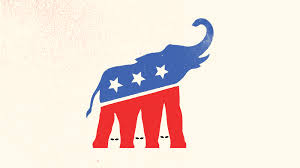Friends,
As House Republicans convulse over electing their next Speaker, the civil war in the Republican Party has come into the open. But it’s not particularly civil and it’s not exactly a war. It’s the mindless hostility of a political party that’s lost any legitimate reason for being.
Today (Wednesday), it looks as though Kevin McCarthy has failed a fourth consecutive vote for speaker as deadlocked Republicans slogged through another day without a leader or sworn members.
The Republican MAGA extremists are demanding a rule allowing them to oust McCarthy at any time, should he fail to bow to their demands in the future; another that would allow them to use spending bills to defund particular programs and fire or reduce the pay of federal officials; and a pledge to hold votes on a balanced budget, term limits, and more border security.
I have no idea what will happen or who ultimately will be selected Speaker, but for all practical purposes the Republican Party is dead as a governing institution.
A half century ago, the Republican Party stood for limited government. Its position was not always coherent or logical (it overlooked corporate power and resisted civil rights), but at least had a certain consistency: the GOP could always be relied on to seek lower taxes and oppose Democratic attempts to enlarge the scope of the federal power.
This was, and still is, the position of the establishment Republican Party of the two George Bush’s, of its wealthy libertarian funders, and of its Davos-jetting corporate executive donor base. But it has little to do with the real GOP of today.
In the 1990s, Newt Gingrich and Fox News’s Roger Ailes ushered the Republican Party into cultural conservatism -- against abortion, contraception, immigration, voting rights, gay marriage, LBGTQ rights, and, eventually, against teaching America’s history of racism, trans-gender rights, and, during the pandemic, even against masks. At the same time, the GOP was for police cracking down on crime (especially committed by Black people), teaching religion with public money, for retailers discriminating against LGBTQ people, and for immigration authorities hunting down and deporting undocumented residents.
Gingrich and Ailes smelled the redolent possibilities of cultural conservatism, sensed the power of evangelicals and the anger of rural white America, saw votes in a Republican base that hewed to “traditional values” and, of course, racism.
But this cultural conservatism was so inconsistent with limited government – in effect, calling on government to intrude in the some of the most intimate aspects of personal life – that the Party line became confused, its message garbled, its purpose unclear. It thereby opened itself to a third and far angrier phase, centering on resentment and authoritarianism.
The foundation for this third phase had been laid for decades as white Americans without college degrees, mostly hourly-wage workers, experienced a steady drop in income and security. Not only had upward mobility been blocked, but about half their children wouldn’t live as well as they lived. The middle class was shrinking. Good-paying union jobs were disappearing.
Enter Donald Trump, the con-artist with a monstrous talent for exploiting resentment in service of his ego. Trump turned the Republican Party into a white working-class cauldron of bitterness, xenophobia, racism, anti-intellectualism, and anti-science paranoia, while turning himself into the leader of a near religious cult bent on destroying anything in his way – including American democracy.
A political party is nothing more than a shell – fundraising machinery, state and local apparatus, and elected officials, along with a dedicated base of volunteers and activists. That base gives fuels a party, giving it purpose and meaning.
Today’s Republican base is fueling hate. It is the epicenter of an emerging anti-democracy movement.
What we are seeing played out today in the contest for the speakership of the Republican House involves all of these parts of the current GOP – what remains of the small-government establishment, the still-fulminating cultural warriors, and the hate-filled authoritarians – now engaged in hopeless, hapless combat with each other, and with the aspirations and ideals of the rest of America.
The Republican Party will continue in some form. It takes more than nihilistic mindlessness to destroy a party in a winner-take-all system such as we have in the United States.
But the Republican Party in this third phase no longer has a legitimate role to play in our system of self-government. It is over.




"Enter Donald Trump, the con-artist with a monstrous talent for exploiting resentment in service of his ego."
That paragraph is dead on and says it all.
While I like what you wrote, and wish it were true, the GOP remnants still control congress perhaps because they have incoherent policies. A majority of people, before the last election, wanted a higher minimum wage, wanted a fairer health care system, wanted college debt reduction, wanted improved infrastructure, and more. Even so too many voted for Republicans. Why? They have a better propaganda system. They are better at translating their ephemeral agenda to a society that wants an enemy to hate. The agenda does not matter, just the existence of a target, which they are good at creating along with Fox and other instruments of propaganda. They won't die as long as the propaganda arm makes a profit. From my vantage point the corporate world that manufactures its own "truth" is doing rather well, so I doubt the propaganda party will die a rapid death. Instead it seems that they will take they rest of the ship of state down with them.